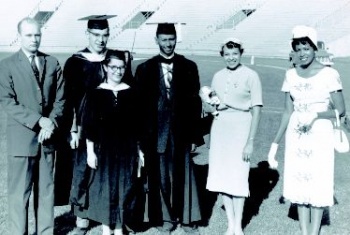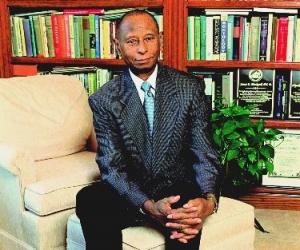Personal tools
Help
Tools
Class Notes
- Do you have news for fellow WSU alumni and other readers of Washington State Magazine? Send us your class note.
Our Story
written by alumni, faculty and friends.
NOTE: THIS IS A LEGACY SITE AND IS NOT REGULARLY MAINTAINED
Views
Blackwell Makes His Mark: Noted Sociologist Receives WSU's Highest Honor
From Our Story
From Washington State Magazine, Fall 2002
Imagine James E. Blackwell's reaction when he found a cross burning in his San Jose, California yard. Anger? Frustration? Fear?
No. Surprise.
After all, this was California in 1962, not the South. Blackwell was teaching at San Jose State University (SJSU), his first job after completing a doctorate at Washington State University three years earlier.
Throughout his life, the black sociologist has tried to bridge the gap between the races. As much as possible, he says, he sought to bring "a greater measure of social, economic, and racial justice to the community" by facilitating inter-group understanding.
Blackwell, 76, began that effort 40 years go. Under his presidency, the San Jose chapter of the NAACP increased its interracial membership from 250 to 1,200 in a single year. More important, the local chapter fought successfully to end discrimination in the community's public recreation facilities, pressured the city council to establish fair housing policies, protested against employment discrimination in local department stores, and helped six students enroll at SJSU on tuition waivers after being expelled from Alabama State University for protesting segregation in Alabama. The chapter also raised thousands of dollars in bail money for Freedom Riders in the South.
Now retired in New Orleans with his wife, Myrtle, Blackwell refers to the four years in San Jose as "a critical time" for him.
"We were outspoken about the goals we had articulated to change the pattern of race relations in San Jose," he says. The NAACP chapter didn't have an office. Members met in private homes, including Blackwell's, where the cross was found afire outside.
In mid-April 2002 Blackwell returned to Pullman to become the 31st recipient of the WSU Regents Distinguished Alumnus Award, the highest honor the University bestows. (See sidebar.)
When he enrolled at Washington State in 1955, there were only 15 black students on campus. Culture shock? "No," he says. There were even fewer blacks in his college at Case Western Reserve University in Cleveland, where he had earned bachelor's and master's degrees. "I knew each one by name."
Blackwell was attracted to WSU by the reputation of its new doctoral program in sociology and the opportunity to teach. He found the faculty helpful and "non-patronizing."
"I had to prove my merit just like anyone else. That's what I liked about Washington State. It was one of the most useful, intellectually stimulating, and challenging experiences I've ever had."
In the late '40s and early '50s, sociologists T.H. Kennedy, dean of the College of Social Sciences, and Wallis Beasley, chairman of sociology, recruited more than a half dozen promising graduate students from historically black colleges. Among them were Charles Ullman Smith '50 and Anna Harvin Grant '56, the first black man and woman to complete their doctorates in sociology at WSU. Blackwell came later. So did William Julius Wilson '66, who received the Regents Distinguished Alumnus Award in 1988.
Beasley remembers Blackwell as "a very good teacher . . . articulate." He was elected president of the Associate Graduate Students; of South House, a men's residence hall; and of the Beta of Washington Chapter of Alpha Kappa Delta, the national honorary in sociology.
Sociologist James F. Short was Blackwell's advisor and chaired his dissertation committee. "He was a wonderful graduate student. Very personable, and a great teacher," Short says. Blackwell's dissertation was titled, "Involuntary Separation: Effects of Imprisonment on the Family." In the course of his research he interviewed inmates at prisons in Walla Walla and Monroe, as well as their wives, girlfriends, and family members.

At a meeting shortly after his arrival, he found he was the only minority in the room. Thereafter, he made it a point to stick his head into every office looking for people of color. At the time, minorities filled only 3.5 faculty positions. He challenged the university president to improve the situation. An Affirmative Action office was established on campus in 1971, the first in the university system. "I thought it was important to sensitize officials to the need for a multicultural student body and faculty, particularly in an urban area like Boston," he says. By the time he retired, 18. 7 percent of the faculty and more than 25 percent of the students were minorities. Women comprised more than 40 percent of the employees.
"We became a model for New England colleges and universities. We showed what could be done without diluting the standards and quality."
Blackwell has always been a strong advocate of desegregation. He believes in access to higher education, and in equality of opportunities for all U.S. citizens. From time to time over the past 30 years, he has worked with various entities to desegregate public higher education, particularly in 18 southern and border states, and he's been called on as an expert witness in court cases involving desegregation. In the '80s and '90s, predominantly white institutions sought his assistance in devising programs that would enable them to recruit more African American students and faculty.
Between his positions at San Jose State and UMass, Blackwell and his wife spent more than two years in Africa. He was acting director of the Peace Corps in Tanzania, and then director in Malawi.
"We were young. We thought we could really make the world a better place," he says. Later, with the USAID and the American Embassy in Katmandu, he traveled to 51 of the 55 political subdivisions of Nepal, a task never before achieved by an American Foreign Service officer. Temporary assignments also took him to India, Bangladesh, Thailand, the Philippines, and Hong Kong.
In 1986, a study reported in Social Forces ranked Blackwell number five among black holders of doctorates in sociology, living or dead.. He helped establish "the clout of black sociologists" as president of the Caucus of Black Sociologist of the American Sociological Association, according to Short. The founding president of the Association of Black Sociologist, Blackwell has also held the presidencies of the Society for the Study of Social Problems and the Eastern Sociological Society. He is the author of many books, including The Black Community: Diversity and Unity.
As a teacher, Blackwell's goal has been to help students gain an appreciation of knowledge, but not for the sake of knowledge alone. "I wanted them to put what they learned to use by going on to graduate and professional schools and becoming important, contributing citizens."
Our Story site map
Our Story main page | Our Story categories | Help Desk
Contact | Give | Advertise
Washington State Magazine | Washington State University | Class Notes
Our Story is coordinated by
In partnership with
Our Story and Washington State Magazine are publications of Washington State University. All rights reserved.
P.O. Box 641227, Washington State University, Pullman, WA 99164-1227 USA | wsm@wsu.edu, 509-335-2388
Accessibility | Copyright | Policies

